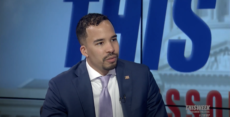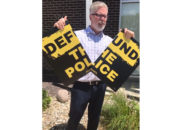Missouri has the seventh-highest incarceration rate in the country – 56 percent higher than Kansas and 64 percent higher than Illinois. If incarceration rates were effective in lowering violent crime, Missouri would be one of the safest states in the nation. Unfortunately, it is not. Kansas’ violent crime rate is 12 percent lower than Missouri’s, while Illinois’ is 19 percent less.
Einstein said that doing the same thing over and over, expecting a different result, is the definition of insanity. Yet, that is what the Missouri Legislature did in passing the “Missouri Street Gangs Prevention Act.” It now sits on Governor Parson’s desk for signature; we urge him to veto this damaging bill.
This legislation sounds great — who wouldn’t want to prevent street gangs? But, the bill’s messy combination of overbroad definitions, sentencing enhancements, and mandatory minimums threaten to put more in prison without increasing public safety.
Current law defines a “street gang” the way most people probably would: a group of three or more people who share a common name or identifying symbol and have as a primary motivation the commission of certain crimes. If a person is found to be a member of a street gang, they can receive a much longer sentence than the crime would otherwise demand.
Its purpose is clearly meant to target the most dangerous criminals who pose a serious threat to public safety. But the bill would easily be used to give longer sentences to people who aren’t really members of a street gang, and who don’t pose that kind of threat to the public.
The bill removes the requirement that people in a street gang share a common name or identifying symbol and removes the requirement that crime is the group’s primary motivation. The legislation makes almost any group of three or more people who have as any criminal motivation “street gang.” This defies common sense.
It would be less concerning if that list of crimes only included the most serious or violent offenses. But all drug crimes other than possession are included. Imagine a group of teenagers selling marijuana being charged with a crime carrying an enhanced sentence, merely because prosecutors classified them as a gang.
Combatting gang violence obviously makes communities safer. But this overbroad definition will divert law enforcement resources from targeting truly violent people while creating yet another mechanism for prosecutors — who already have powerful tools to target gang violence — to coerce plea bargains from those who aren’t part of a gang as we think of one.
The legislation also creates new sentencing enhancements and mandatory minimums, despite a large body of evidence showing that sentence lengths have little-to-no effect on crime deterrence or recidivism. In fact, studies show they have the opposite effect because they draw resources away from more effective crime control strategies, such as violent crime task forces, addiction treatment, and yes, more cops on the street.
Mandatory minimums can also have unjust results. They remove a judge’s ability to base decisions on the unique facts of each case. Mandatory minimums were designed to ensure everyone who committed similar crimes would get similar sentences. But in reality, they just shift power from judges to prosecutors, who can pick and choose who to charge with crimes carrying mandatory sentences.
Tough-on-crime states like Texas, Utah, Georgia, and Louisiana have figured out that locking up more people doesn’t translate to safer neighborhoods. It just eats up tax dollars and hollows out our police departments. With a massive budget crunch, Missouri should not force taxpayers to pay for more prison cells unless it makes people safer. Missouri Street Gangs Prevention Act will fail in that regard.
Equally important during this volatile time, data clearly shows that African Americans are twice as likely to be charged with a mandatory minimum crime than non-minorities. While the rest of America is looking for ways to reform criminal justice policies that unduly impact black communities, Missouri is now poised to exacerbate the problem.
Yes, the Missouri Street Gangs Prevention Act sounds good. But it will cost too much, do too little, and further exacerbate racial tensions. Now is not the time to continue this dangerous cycle of overcriminalization and mandatory minimums. Now is the time for reform.

Jeremy Cady is state director of Americans for Prosperity-Missouri. David Safavian is the general counsel of the American Conservative Union and a graduate of St. Louis University. Alyse Ullery is a policy analyst with the American Conservative Union Foundation











